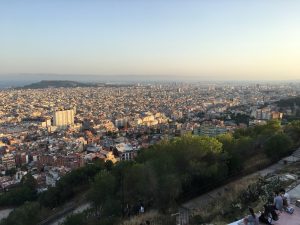When studying a languages degree, it is obligatory to spend your third year abroad. Despite the fact that many people thought this meant I had a year-long holiday whilst everyone back home was writing dissertations, it actually meant working 40+ hours a week, speaking more Spanish daily than ever before and learning more about the culture than I ever could from a textbook.
What did you do in Spain?

In August last year, I started a five-month placement at a Spanish language school in Barcelona. In a nutshell, my responsibilities included working as a receptionist, carrying out administrative tasks, answering phone and email enquiries and translating content to go onto the English version of the website. Having never worked a full–time job before, the first few weeks were perhaps the most exhausting and a bit daunting. Nevertheless, once I had settled and got to know my colleagues, I started to really enjoy the work I was doing. After a month, I was put in charge of the school’s Spanish evening course. This was the part that I perhaps enjoyed the most because, whilst it was a lot of work on top of what I was already doing, I really enjoyed having something for which I was solely responsible.
How did you find your placement?
The hardest part was probably finding the job itself. I started looking for an internship early on in my second year, sea rching Spanish job sites and lists of placements previous students had been on. Don’t be disheartened if you send lots of emails and CVs and receive few replies as this tends to be the norm. One day, whilst thinking I was never going to find anything, I came across the language school’s website and found that they offered work placements. Whilst the initial application process took a while, it was definitely worth it. So, keep looking and you definitely will find something!
rching Spanish job sites and lists of placements previous students had been on. Don’t be disheartened if you send lots of emails and CVs and receive few replies as this tends to be the norm. One day, whilst thinking I was never going to find anything, I came across the language school’s website and found that they offered work placements. Whilst the initial application process took a while, it was definitely worth it. So, keep looking and you definitely will find something!
What were the benefits of working abroad?
Working in another country was a great opportunity to meet and work with people from all over the world whom I might otherwise not have had the opportunity to meet. When working such long hours, sometimes even weekends, it was easy to feel that all I was doing was working. So one thing I would suggest to help adapt to living in a new country is throwing yourself into different activities outside of the workplace. This way you get to know more of the city and the culture.
Having now started to think about future job applications, I think the year abroad was a very valuable experience. Working abroad shows international experience, highlights language skills and shows you can adapt to different working environments.
The Careers Service can help you to research different countries using the GoinGlobal database, as well as providing resources to help with applications.



 rching Spanish job sites and lists of placements previous students had been on. Don
rching Spanish job sites and lists of placements previous students had been on. Don